Aaa, sou desu ka.
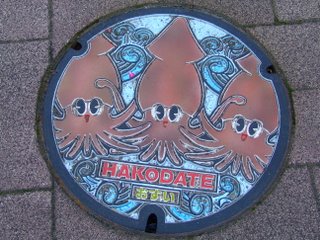 That is my favorite, and most commonly used, Japanese phrase. Its has many subtle meanings depending on the context, but basically means "I see." It carries with it an exceptionally large emotional understanding that can either reinforce the speaker's position, or be used to politely distance yourself away from the speaker. For that reason, it can be challenging to understand what is actually meant when a person says "sou desu ka," and is a relatively safe expression to use in a variety of situations.
That is my favorite, and most commonly used, Japanese phrase. Its has many subtle meanings depending on the context, but basically means "I see." It carries with it an exceptionally large emotional understanding that can either reinforce the speaker's position, or be used to politely distance yourself away from the speaker. For that reason, it can be challenging to understand what is actually meant when a person says "sou desu ka," and is a relatively safe expression to use in a variety of situations. "Nihongo Dake" rule = you can only speak Japanese.
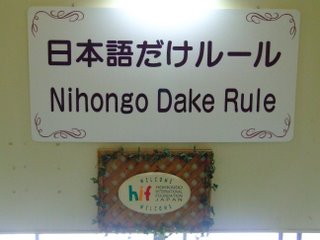
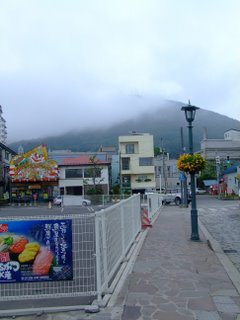
The language school offers quite a few Japanese culture classes, like Japanese sweets making or the tea ceremony - and this is a picture of the nearby middle school's tea ceremony club who taught us how to do a tea ceremony.
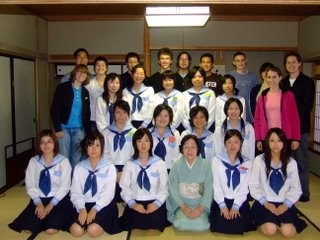
Today we heard a lecture by Dr. Seiichi Makino who is a Japanese language and culture professor at Princeton. He wrote the Dictionary of Elementary Japanese Grammar and the Dictionary of Intermediate Japanese Grammar, and edited the Japanese text book we use at KU. In other words, he is an exceptionally well known figure in the Japanese language teaching world, and is a highly respected cultural anthropologist. In Japanese culture and language a well known concept is "uchi/soto" or "inside/outside" relations. How one sees oneself in relation to other people and objects significantly influences the way one
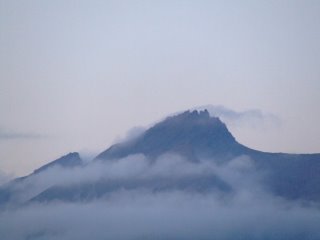
speaks, acts and behaves around those people or objects. For example, one's home is called "uchi" in Japanese - which refers to one's internal core. It should be a safe place and where the restraints of acting and speaking politely in the external world or "soto" breakdown. People inside the family unit share a common uchi, but friends build a feeling of uchi together, as well as coworkers who go drinking after work. Because the Japanese language is a hierarchical language with several levels of politeness, understanding one's place in the relationship with another person, and where one falls in the "uchi/soto" view of reality is critical for correctly navigating the complexities of ever changing Japanese relations and social situations.
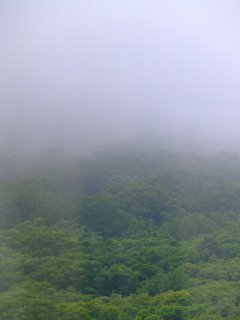
For example, when two similar aged people meet for the first time, usually they will speak in polite speech out of a feeling that the other person is in one's "soto" world. Over time when the familiarity and trust increases, the relationship creates a shared sense of "uchi" or closeness. At that point the speaking style switches from polite to casual. This is a relatively simple example of "uchi/soto" implications on speech and behavior in Japanese society - and is a source of never ending frustration for students like me.
I couldn't have asked for a better homestay experience. My host family are very kind and flexible people. The father works for a religious organization called "Tenrikyo" and is a type of Shintoism. In the house is a "shinden" which is a temple room - and there are three shrines for three different "kami" (gods). Everyday about 4 times a day the host mom and dad perform a religious ceremony, and members of the church come to the shinden.
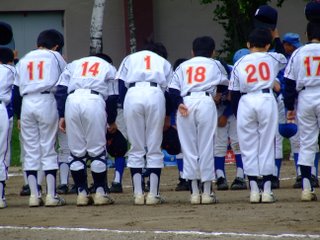
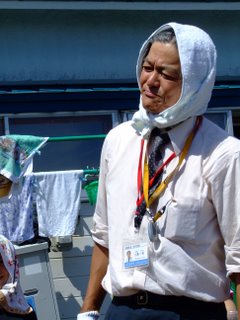
So it is not very unusual to walk into the house and hear them performing Gagaku (Japanese court music from 600 years ago) and singing songs of praise to the Father Kami. The religion is very peaceful and believes that everything comes from the same God, and so everyone are brothers and sisters. The purpose of life is to live a joyous life. When one's path falls away or differs from what God has in mind for us we may experience sickness or some other type of experience that helps draw us back toward our true purpose in this life.
The host mom is very very kind and puts up with me and the other student staying with the host family named Sam. There are three boys, Haru, Naru and Teru - who all play baseball, and as far as I can tell, are probably some of the best behaved young boys I've ever seen. Haru is the oldest and doesn't like to study much, so the family is always joking that he won't get into a good highschool. In Japan you have to test into highschool.

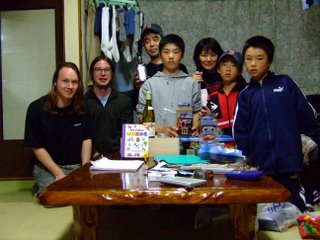 (a sample dinner)
(a sample dinner)A couple weekends ago the school took us to a nature park called Oonuma. While the Japanese version of natural parks is different than those in the US - it can be said Japan is a country of awe inspiring natural beauty. The weekend was organized to help the new students get to know each other better - and after buying out all the alcohol from the hotel's vending machines and renting a Karaoke room - I'm pretty sure we all got to know each other a little bit better. The hotel also had an onsen - which is a natural spring hot water bath. It functions as a public bath and is an interesting experience in Japanese culture to share the act of bathing together, walking around naked and soaking in a super super hot bathtub. These pictures are from Oonuma.
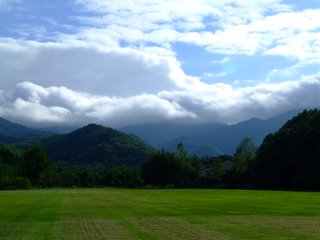
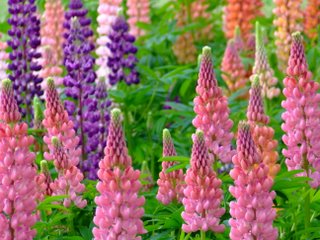
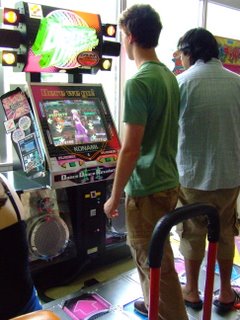
Another weekend Sam and I were picked up by Sakaruya San, another exchange student's host mom. She took us to a Buddhist church of some kind I couldn't figure out, and we listened to a two hour lecture on environmental issues in Japanese. The only thing I could really understand was when the speaker was talking about how much energy could be saved if Americans would carpool more - and also Japanese people. After the lecture the younger people at the church held a barbeque and had my first taste of Hakodate squid. Hakodate is famous for its squid - and there are hundreds of squid manhole covers dotted around the streets in this city. You can also try squid flavored ice cream here - which is actually just like really sweet cream.
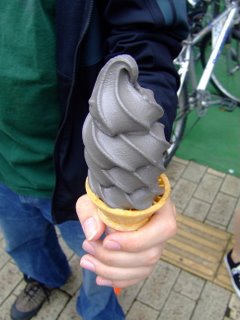

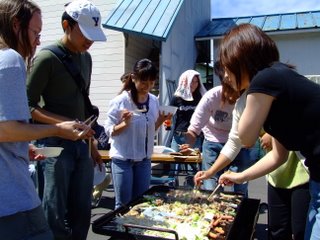
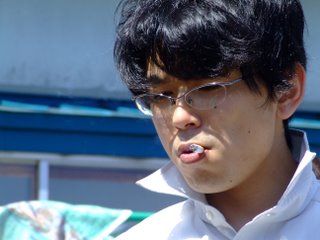
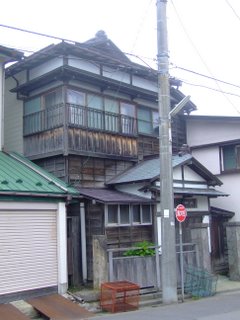
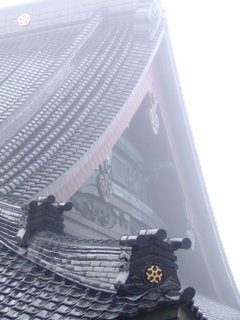
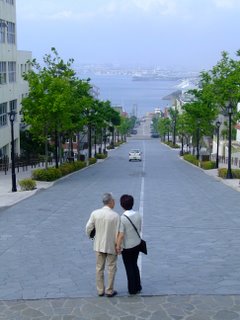
School keeps me busy - everyday about 4 or 5 hours of homework. By the end of the week my mind feels like its been through a food processor and is a big mish mashy gloop of incoherent Japanese particles and kanji radicals. I'm enjoying it.
I hope you'll enjoy the rest of the pictures. Most of these are taken around the school. Vending machines are everywhere here, and the one on the right is my favorite - it serves some of the best hot chocolate I've ever tasted.
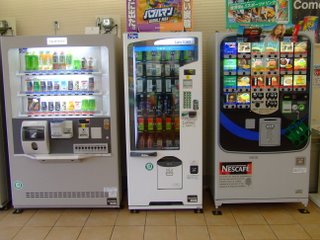
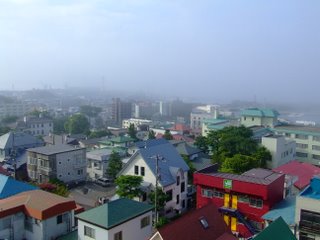
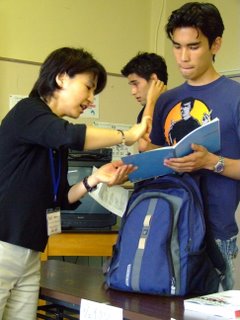
It's time to study....jaa ne.
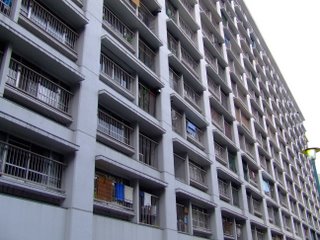

3 Comments:
Rick... you're the best for taking the time to show us Japan through your blog! I"ve been fancy-ing up my google homepage and added the dilbert cartoon of the day and the buddhist thought of the day... I really like this one: "Ask yourself this, 'Are you a human being having a spiritual experience, or a spiritual being having a human experience?'"
hi. i hope you write a book. japan is frustratingly beautiful sometimes. i love the weay the houses and mountains dissolve into the white luminosity.
may i put a link to your blog on my blog?
命ははかないでしょう。
尊いぞ
人間の命
はかないぞ
人間お命
みつを
今,窓の中に雲が山の下をキッスしています。空の顔を見ていると心の中の波が静まる。深い静寂。自分の意識は常にすでに広大な空。
じゃ、
まった会いましょう!
Post a Comment
<< Home